Student recreates the face of a druid from Stornoway
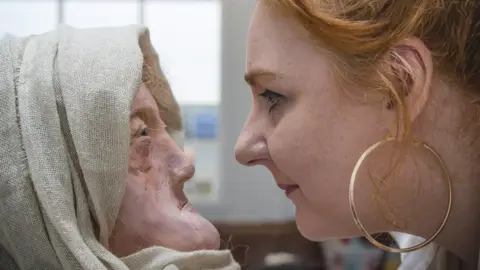 University of Dundee
University of DundeeThe face of a woman believed to have been a Scottish druid has been recreated by a student from the University of Dundee.
The woman could have been more than 60 years old when she died during the Iron Age, some time between 55BC and AD400.
Nicknamed Hilda, she is thought to have lived near Stornoway.
She is thought to be of Celtic origin and her skull now resides in the Anatomy Collection at the University of Edinburgh.
The skull was first presented to the Phrenological Society of Edinburgh in 1833, described as one of the six "Druids of the Hebrides".
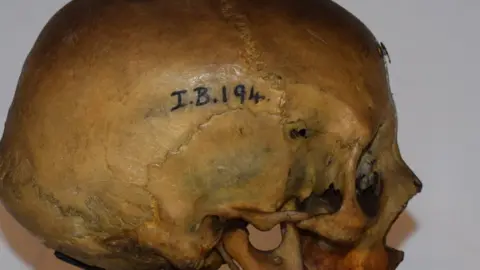 Anatomy Collections, University of Edinburgh
Anatomy Collections, University of EdinburghExperts believe her longevity suggests she could have have come from a privileged background as the average life expectancy of women at the time was about 30.
To capture the unique characteristics of Hilda, the original skull was scanned at the University of Dundee.
Karen Fleming, a forensic art student at the university, then put some flesh on the bones.
She said: "Hilda was a fascinating character to recreate. First I put the facial muscles on and then I had to build up the skin and that starts to build up the actual face.
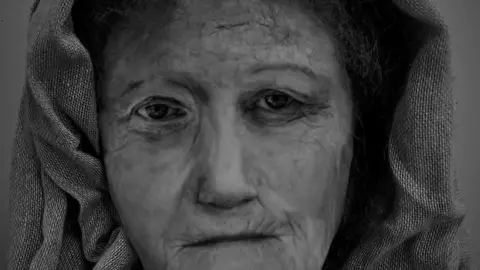 University of Dundee
University of Dundee"There's measurement taken for the skull and the ears and if they have teeth you can measure for the lips.
"It's clear from the skull she was toothless before she died, which isn't too surprising considering the diet of folk back then but it was impressive how long she lived."
Using the 3D replica, Karen then started to build up the face using wax, a process she described as painstaking, often having to battle the hot summer days to ensure Hilda did not melt.
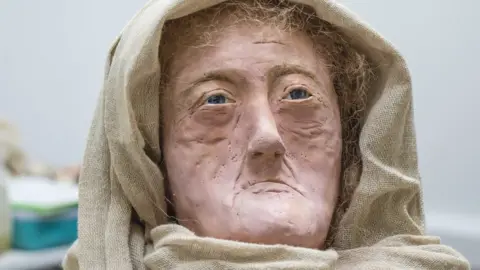 University of Dundee
University of DundeeShe added: "I've no idea where the name Hilda came from, she just looked like a Hilda.
"I've heard of druids in the sense of people who follow it now. There are no reliable facts to prove that they even existed or the way that they were portrayed in classical literature."
What is a druid?
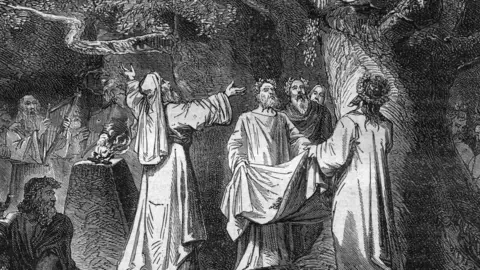 Apic
ApicThe term druid was a common word in the ancient Celtic language, usually referring to someone who was an expert in magic or religion. It could have been used for someone who communicated with goddesses and gods, or someone who claimed to be able to predict the future.
The broad term makes it difficult for experts to prove what druids actually were.
Ronald Hutton, professor of history at Bristol University is a leading authority on druids. In his book 'The Druids: A History' he explores what people have thought about ancient druids.
Dr Hutton said: "There would certainly have been druids in Scotland, for the very pedantic reason that the ancient Scots spoke a Celtic language. Because druid is the word in their language for a religious or magic specialist they must have had druids.
"The problem is knowing what the word actually means in practice. Because there are a lot of Celtic languages spoken by a lot of Celtic people from the Iron Age, it can mean all sorts of things from somebody who's a blacksmith who dabbles in magic on the side... could have been a chieftainess or a member of an elite family"
Because the term is so broad, it is difficult to know what Hilda's role in society would have been.
Julius Caesar
He added: "We know there were female druids as well as male druids because late Roman sources near the end of the Roman Empire speak of druidesses.
"For what these druidesses are doing are telling fortunes often in taverns, they aren't powerful figures but then as I say if druid is simply the Celtic word for anybody who deals with magic or religion.
"In Celtic speaking societies you can have druids with everything from really important decisive figures in society to somebody sitting in a tavern reading palms, they're both druids."
Some of our knowledge of druids is derived from the writings of Julius Caesar who encountered them during his conquests - but his accounts are considered by some to be unreliable.
"There are problems, first being that Caesar is a prized liar, as people said at the time," said Dr Hutton. "He's a very skilful propagandist who could have easily misrepresented what druids are in order to justify his conquest of their lands.
"The other problem is the passage about druids in Caesar's books may not have been by Caesar. It sticks out like a sore thumb and contradicts some of what Caesar himself says in the text. There are major problems about treating him as reliable."
Hilda will go on display this Sunday as part of the Master's Show, held at the University of Dundee which is a showcase of artistic designs. More than 80 students will display their work during the show, which runs from Friday 16 to Sunday 25 August.
